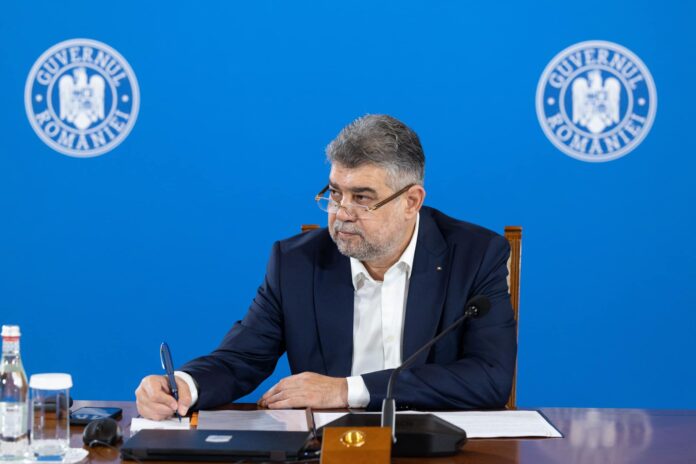Romania’s archives for Holocaust research are open, and the next step will be their digitization, Prime Minister Marcel Ciolacu conveyed in a message read on Tuesday by Alexandru-Mihai Ghigiu, head of the Prime Minister’s Chancellery, at the international conference „20 years since the Final Report of the International Commission on the Holocaust in Romania – Elie Wiesel”, which took place at the Government headquarters.
„Today Romania’s archives for Holocaust research are open. The next steps we need to take are to identify the best solutions for digitizing these archives and making them widely accessible. At the same time, we will continue to work together with the ‘Elie Wiesel’ Institute for the opening of the new National Museum of the Jewish History and the Holocaust in Romania,” reads the prime minister’s message.
Marcel Ciolacu further affirmed that, „if 20 years ago Romanian society needed an international commission to assume its own historical past, everything we are doing today, all the measures being adopted and the steps taken are government public policies or civic initiatives”.
At present, the prime minister said, „we have reached the point where the memory of the past and historical consciousness require us to be consistent in order to cement a responsible, democratic society based on respect for human rights, a society in which we hope that hatred will no longer echo” .
He recalled that in 2021, the Romanian government appointed for the first time a special representative to combat anti-Semitism, xenophobia and remembrance policies. The first national strategy was adopted back then and three years later the second, for the period 2024-2027.
Starting with 2022, the implementation of the strategies has been coordinated by a secretary of state with the Chancellery of the Prime Minister.
„It is not enough,our aim is not only to prevent and combat hate speech, but also to invest further in education and in continuing training programs for those working in the administration and beyond,” premier Ciolacu mentioned.
In her turn, Foreign Affairs Minister Luminita Odobescu recalled the Hamas attack against Israel.
„On October 7 last year we saw with terror what the unleashing of a wave of hatred against members of the Jewish community means. It is extremely difficult to understand that more than 80 years after the events of the Holocaust, members of the Jewish community face the fear of attacks and violence around the world. The unprecedented rise in anti-Semitism globally is worrisome. Even in Romania, an area until recently free of such radical manifestations, we are unfortunately seeing an increase in anti-Semitism, especially online. We therefore have a shared responsibility and a moral duty to step up our efforts in prevention,” the head of Romanian diplomacy pointed out.
Education Minister Ligia Deca said that since the Elie Wiesel Report was adopted 20 years ago, Holocaust studies have been gradually integrated into the curriculum of pre-university students.
„If a few years ago we had a few thousand students who chose this optional course, now we have almost 180,000 students studying the Holocaust and Jewish history, which encourages both empathy and resistance to prejudice,” said Deca.
The director of the „Elie Wiesel” National Institute for the Study of the Holocaust in Romania, Alexandru Florian, emphasized the institute’s role in research, education and combating anti-Semitism. In this regard, he said that one of the alternative textbooks on the history of the Holocaust for the 11th grade is written by the institute he heads.
The National Institute for the Study of the Holocaust in Romania also publishes an annual report monitoring anti-Semitic discourse. Alexandru Florian said that „leaders have learned what Holocaust history and Holocaust remembrance mean and there are no demonstrations as there were 20 years ago in the traditional public space, in public institutions, but in the online space, on social networks, on the internet, the situation is quite worrying”.
He also mentioned the work against promoting the memory of war criminals. Thus, Alexandru Florian said that last week the Institute won in first instance a lawsuit with the Bucharest City Hall to change the name of Mircea Vulcanescu Street – a person convicted for war crimes, member of the Ion Antonescu government for three years, from 1941 to 1944.
„We will have a new street in Bucharest with a name linked to the name of the Holocaust,” he said.
He also evoked the project of the National Museum of the Jewish History and the Holocaust in Romania and recalled that it was started with the support of Mihnea Constantinescu. „It will be an exceptional achievement in terms of significance. Unfortunately, the project is being delayed, but we will mobilize all the institutions involved and I hope it will not be delayed for too much longer,” Florian said.
Eduard Kupferberg, secretary general of the Federation of Jewish Communities in Romania – Mosaic Cult, described Romania as a safe country.
„We can proudly say that Romania is one of the very few countries in Europe where, as a Jew, you can peacefully walk down the street without worrying that you will be spat on, sworn at or, worse, have your life endangered,” he said.
However, Eduard Kupferberg said anti-Semitism „still exists” and is „very vocal in Romania”.
„We have had the opportunity to listen to a language worthy of the Iron Guard even in the Romanian Parliament, which shows that a part of Romanian society still thinks like that, still is anti-Semitic, still hates Jews and probably hates not only Jews, but Jews are the way they can materialize their xenophobia. So there is still a lot of work to do before anti-Semitism, xenophobia, racism truly disappear from society,” said Eduard Kupferberg.
AGERPRES




